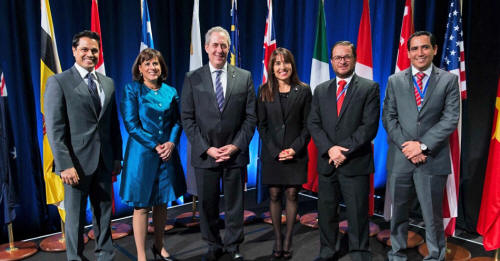|
some of whom are pictured above, signed the TPP on February 4th in New Zealand. Now, all 12 Pacific Rim countries will be able to begin their respective domestic ratification processes, which in the U.S. means passage by Congress.
(Photo: US Embassy/flickr/cc)
Facing an uphill battle to convince Congress and public, White House says 2016 will be 'historic year for US trade policy'.
The White House is gearing up for a full-court press in support of the corporate-friendly Trans Pacific Partnership (TPP), launching its latest public relations campaign in favor of the deal on Wednesday with a "flashy" annual trade agenda.
The TPP is "at the heart of this agenda," declares the document released by the Office of the U.S. Trade Representative (USTR).
The 2016 blueprint also highlights the administration's efforts to conclude other controversial trade agreements, including the TransAtlantic Trade and Investment Partnership (TTIP) between the U.S. and Europe and the Trade in Services Agreement (TISA), currently being negotiated by the U.S., EU, and 22 other countries that account for two-thirds of global GDP.
So too do opponents of what WikiLeaks has called,
Indeed, watchdog group Public Citizen put out a memo on Wednesday debunking several of the Obama administration's TPP talking points.
For example, while the USTR claims the TPP will,
According to the memo:
Public Citizen also on Wednesday put out a video suggesting that with members of Congress across the political spectrum lined up "staunchly against the deal," the TPP is dead-on-arrival.
At the end of last month, President Barack Obama said that he was "cautiously optimistic" that Congress would pass the TPP, while acknowledging that opposition in both parties and election politics could slow down the effort.
But Senate Majority Leader Mitch McConnell (R-Ky.) is among other leaders who have said that the TPP is unlikely to get a vote until after the November elections.
Presidential candidates Bernie Sanders, Hillary Clinton, and Donald Trump have all expressed opposition to the deal.
In February, at the end of the negotiating process, Sen. Elizabeth Warren (D-Mass.) urged her colleagues,
Noting that,
Just last week, environmentalists pointed to a World Trade Organization (WTO) ruling on India's rapidly growing solar energy program as evidence of the TPP's potential harms.
|


